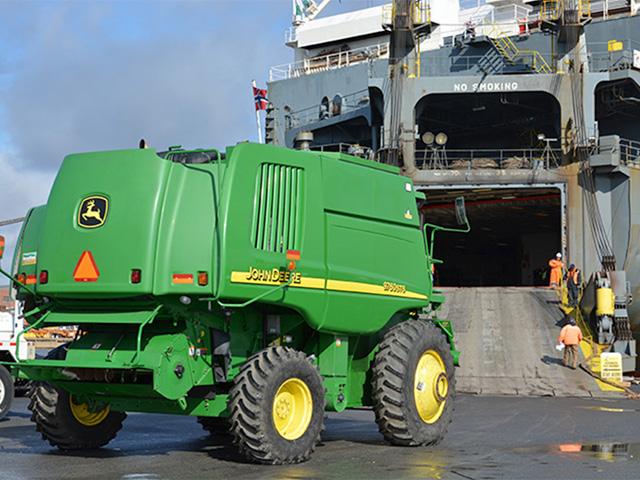Baltimore Bridge Impact on Ag Machinery
Baltimore Bridge Collapse Could Affect Farm Machinery Shipments
BIRMINGHAM, Ala. (DTN) -- Rescue workers continued to search Tuesday evening for six missing people around the 1.6-mile-long Francis Scott Key Bridge that collapsed overnight in Baltimore after a fully loaded container ship veered into one of its support structures. Two other people were rescued, one unhurt and one in critical condition.
(For more about the accident, see DTN story at https://www.dtnpf.com/…, including the port's importance for agricultural commodities.)
With the transportation disaster comes key questions about the Port of Baltimore's ability to continue operations. The port accounted for a record 52.3 million tons of foreign cargo last year worth $80 billion.
The Port of Baltimore is a key import-export point for farm and construction machinery. The port tallied a record 1.3 million tons of roll on/roll off farm and construction machinery in 2023 (the previous record was 1 million tons in 2012).
P[L1] D[0x0] M[300x250] OOP[F] ADUNIT[] T[]
Closer by 150 miles than any other mid-Atlantic harbor to Midwest markets, the port is the nation's largest roll on/roll off (ro/ro) transportation hub for nearly every ag equipment manufacturer in the United States.
Ro/ro customers at the port include CNH Industrial (Case IH and New Holland Agriculture), Caterpillar, John Deere, AGCO (Fendt, Massey Ferguson), CLAAS and Komatsu. Some customers, such as John Deere, have been doing business with the port for more than 30 years.
AGCO maintains an assembly facility 27 miles from the port. It is there that its Fendt and Massey Ferguson tractors arriving in the U.S. are received and ready for shipment to its farming customers.
AGCO, speaking with DTN/Progressive Farmer Tuesday afternoon, foresees no negative impact on its customers due to the bridge collapse. While the manufacturer works to understand the situation at the Port of Baltimore, it is also currently looking at alternative shipping routes and ports to receive its machinery.
The Port of Baltimore is also key to CNH Industrial's imports and exports. In recent years, CNH average annual volume through the port averages between 14,000 and 16,000 units. That equipment includes tractors, combines and baling equipment. Construction equipment includes excavators, compactors, wheel loaders and backhoes.
CNH Industrial's exports are manufactured in the U.S. and sent to markets in Europe and Australia. Imports arrive from production plants throughout Europe and Asia, for distribution in the U.S. and Canada.
With the accident early Tuesday morning, vessel traffic in and out of the Port of Baltimore is suspended until further notice, the Maryland Department of Transportation Port Administration said in a short release Tuesday. "This does not mean the Port of Baltimore is closed. Trucks are being processed within our marine terminals. At this time, we do not know how long vessel traffic will be suspended," the department said.
The Port of Baltimore is not the largest facility along the mid-Atlantic coast, yet it ranks first among the nation's ports for volume of autos and light trucks, farming and construction equipment, imported sugar and imported gypsum; ninth among major U.S. ports for foreign cargo handled; and ninth for total foreign cargo value.
Dan Miller can be reached at dan.miller@dtn.com
Follow him on X, formerly known as Twitter, @DMillerPF
(c) Copyright 2024 DTN, LLC. All rights reserved.




